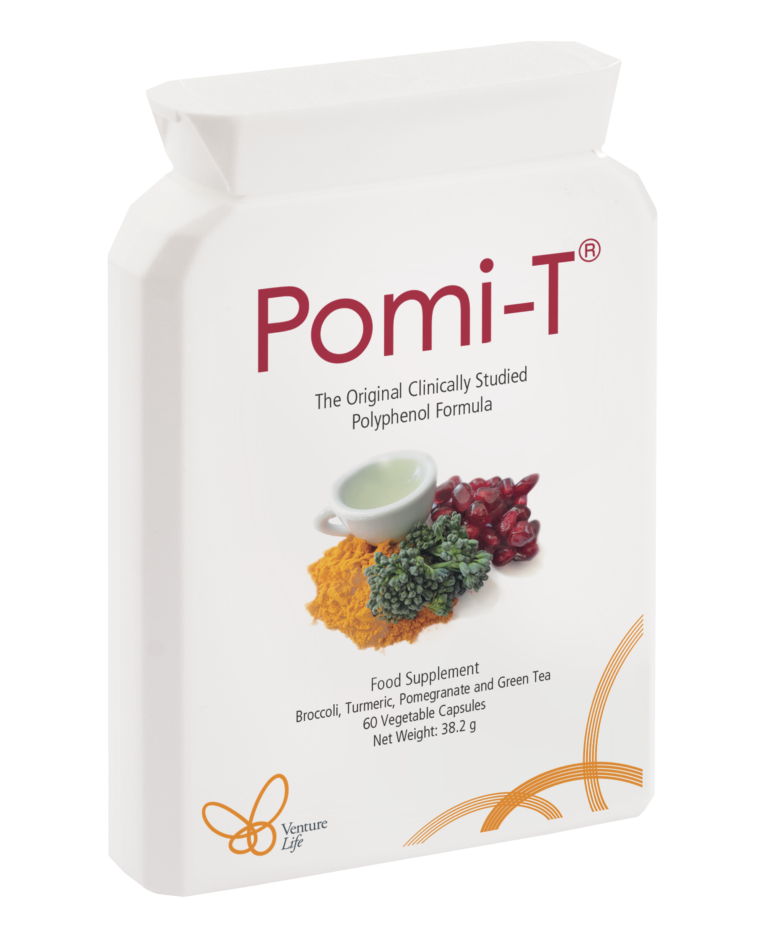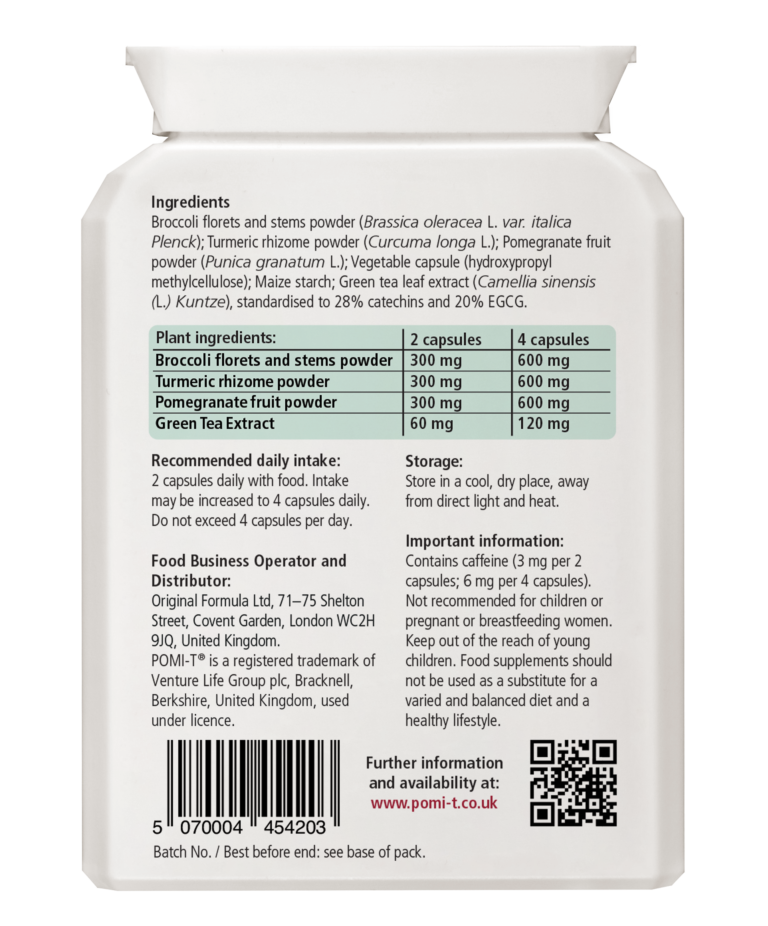Scientifically studied. Trusted by consumers over many years.
Select your supply size ↓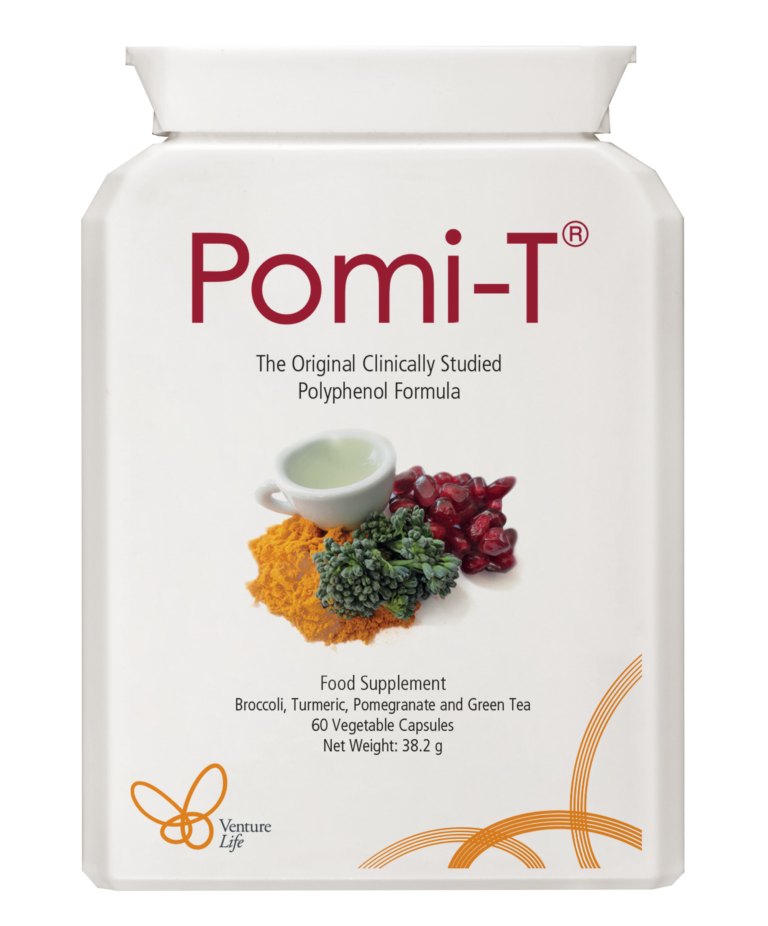
THE ORIGINAL CLINICALLY STUDIED POLYPHENOL FORMULA
Pomi-T® combines broccoli, turmeric, green tea and pomegranate in its original multi-polyphenol formulation, delivering a consistent blend of naturally occurring polyphenols in one convenient daily capsule.
All ingredients are sourced from trusted suppliers and independently tested in qualified laboratories to ensure purity, quality and consistency.
The Pomi-T® formulation has been the subject of scientific research, including evaluation in a UK national, randomized, double-blind, placebo-controlled human study. It has been available to consumers for many years as part of a regular dietary supplement routine.
The Science Behind Pomi-T®
When reviewing scientific research, study design matters. It influences how results should be interpreted and how conclusions are drawn.
The original Pomi-T® formulation was evaluated in a well-controlled, independently supported study conducted in the UK, using recognized scientific methods.
Study Features
Methodology:
A randomized, double-blind, placebo-controlled design — a widely accepted approach used in research to help reduce bias.
Focus:
The study was designed to evaluate the Pomi-T® formulation itself, rather than broader combinations of multiple variables.
Context:
Other studies in this field have examined several factors simultaneously. As a result, their findings address different research questions and are not directly comparable.
Because studies use different designs, other formulations cannot be directly compared with the formulation evaluated in the Pomi-T study. This helps establish a clear and specific connection between the Pomi-T® product and the scientific evidence that supports it.
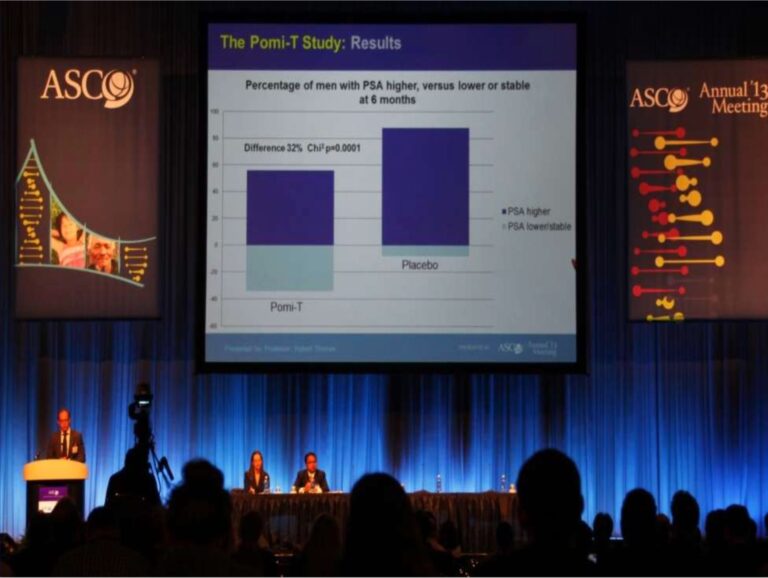
Details of the Pomi-T study design are available in the published scientific literature.
Pomi-T® is a dietary supplement and is not intended to diagnose, treat, cure, or prevent any disease.
Designed as a single, consistent daily formulation. No need to combine multiple supplements.
POMI-T® POLYPHENOL FOOD SUPPLEMENT
- Broccoli (Brassica oleracea) florets & stalks — 150 mg
- Turmeric (Curcuma longa) root — 150 mg
- Pomegranate (Punica granatum L.) whole fruit & seed — 150 mg
- Green Tea (Camellia sinensis) leaf extract — 30 mg
Most customers choose 6 bottles or more
Especially when part of a shared routine
CHOOSE THE OPTION THAT FITS YOUR ROUTINE
3 Months
- You save $6.00 (6%)
- Only $1.10/day
- Total $98.97
6 Months
- You save $30.00 (14%)
- Only $1.00/day
- Total $179.94
12 Months
- You save $96.00 (23%)
- Only $0.90/day
- Total $323.88
18 Months
- You save $180.00 (29%)
- Only $0.83/day
- Total $449.82
Each bottle contains 60 capsules.
Recommended intake is 2–4 capsules daily. Daily cost is calculated based on 2 capsules per day.
Broccoli
The leafy florets and stalks of broccoli are known to contain isothiocyanate and sulforaphane.
Turmeric
Curcumin gives turmeric its vibrant yellow colouring. For centuries, turmeric root has been acclaimed for its properties and it has been subject of many studies in the last few years.
Pomegranate
We don't just use pomegranate juice, we also include parts you don't usually eat — the skin and seeds, which contain ellagic acid, a natural polyphenol.
Green Tea
Polyphenols, such as epigallocatechin gallate (EGCG) are extracted from the leaves of the green tea plant.

Broccoli (Brassica Oleracea var. Italica)
Isothiocyanate and its metabolite sulphoraphane are derived from the breakdown of sulfur-containing compounds found in cruciferous vegetables. Evidence reported in some publications indicates that isothiocyanate can impact multiple cellular and metabolic pathways, including cell death, cell signalling and oxidative stress(1).
References
- Wu, X, et al. Acta Pharmacologica Sinica. 2009; 30(5): 501.

Turmeric (Curcuma Longa)
As reported by several publications, curcumin is believed to have direct and indirect antioxidant activities through its ability to scavenge free radicals, and to activate detoxifying enzymes, such as glutathione-S-transferase(1).
References
- Gonzalez-Reyes S, et al. Oxidative Medicine and Cellular Longevity. 2013; article ID 801418.

Pomegranate (Punica Granatum)
The pomegranate skin contains the highest content of polyphenols in the fruit. It contains a type of polyphenol called ellagitannins. Ellagitannins are hydrolysed to ellagic acid in the gut. Pomegranate also contains other polyphenols, such as anthocyanins and flavanols(1).
References
- Turrini F, et al. Oxidative Medicine and Cellular Longevity. 2015; article ID 938475

Green Tea (Camellia Sinensis)
The health-promoting effects of green tea have been subject to extensive research, and are attributed to the antioxidant properties of catechin polyphenols(1).
References
- Du GJ, et al. Nutrients. 2012; 4: 1679-1691.
POLYPHENOLS: A NATURAL PART OF PLANT FOODS
Polyphenols, and foods that contain them, continue to attract growing scientific and academic interest in the context of dietary patterns and overall nutrition. This research has increased attention on polyphenol-rich ingredients within food and supplement formulations.
As a result, carefully formulated blends using multiple plant sources are often explored within evidence-informed approaches to nutrition.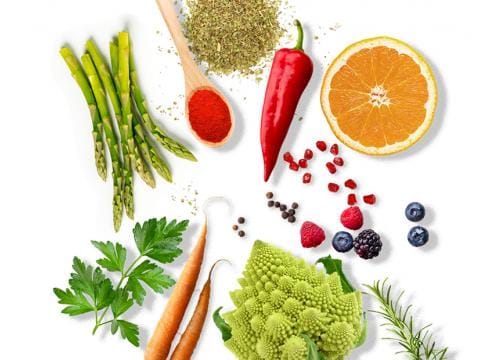
POMI-T® PATH TO QUALITY
From ingredient selection to finished capsules, quality is embedded into the Pomi-T® formulation through a defined and repeatable process.
Ingredients are combined according to established formulation standards, with careful attention to balance, consistency and suitability within a multi-polyphenol blend.
Each batch is reviewed against defined quality criteria before release, supporting a formulation that remains consistent over time.
This structured approach reflects a commitment to reliability, transparency and long-term trust.
Our meticulous Pomi-T® Quality Assurance process
Have additional questions about Pomi-T®? For more information, visit the FAQ Page!
Educational Videos
Nutritional lifestyle changes
Eileen Kaner, MSc, PhD, Hon FRCP gives an overview of a session focusing lifestyle behaviour and cancer prevention presented at the 2015 National Cancer Research Institute (NCRI) Cancer Conference. The session outlines current epidemiological and behavioural evidence on the relationship between different lifestyle choices and the development of cancer.
Reducing Your Risk
Stacey Kenfield, DSc gives an overview of her talk at the 2015 National Cancer Research Institute (NCRI) Cancer Conference.
Dr. Kenfield talks about how lifestyle changes, such as physical activity and diet, can reduce the risk of progression of prostate cancer.
Lifestyle behaviour and cancer prevention (European Medical Journal)
Nutritional lifestyle changes
Eileen Kaner, MSc, PhD, Hon FRCP gives an overview of a session focusing lifestyle behaviour and cancer prevention presented at the 2015 National Cancer Research Institute (NCRI) Cancer Conference. The session outlines current epidemiological and behavioural evidence on the relationship between different lifestyle choices and the development of cancer.
Reducing prostate cancer progression and mortality: what patients can do to reduce risk. (European Medical Journal)
Reducing Your Risk
Stacey Kenfield, DSc gives an overview of her talk at the 2015 National Cancer Research Institute (NCRI) Cancer Conference.
Dr. Kenfield talks about how lifestyle changes, such as physical activity and diet, can reduce the risk of progression of prostate cancer.

